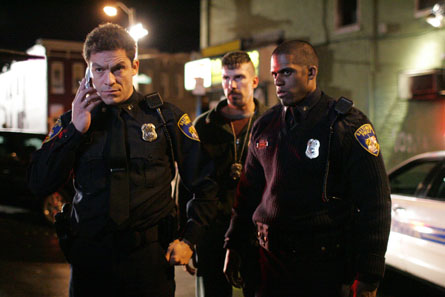These days the short answer has something to do with children (or not reporting someone who had something to do with children). But for high minded ministers, what about the ministering word and sacrament could get you locked up?
Doug Wilson’s recent encounter with FBI agents got me thinking:
A few weeks ago, I got a call from an FBI agent (apparently on the road) to see if I would be in my office later that afternoon. I acknowledged that I would be, and we arranged a time. At that arranged time, two field agents showed up, very personable, professional and polite. As far as I knew, it could be anything from running a security check on someone who had me down as a reference to hauling me off for thought crimes against our Brand New Republic.
I asked them if I should have a colleague sit in, and they said that would not be necessary. So then, we sat down, and though I may not have looked like I was all agog, I was all agog on the inside. Imagine my delight when it turned out that our topic was “No Quarter November,” specifically the first post in that series, and more specifically than that, the first paragraph in that post. As you may recall, the title of that post was “Burn All the Schools.” And here is the offending paragraph.
H.L. Mencken once suggested a shrewd educational reform that has somehow not caught on. He said that there was nothing wrong with our current education establishment that could not be fixed by burning all the schools, and hanging all the teachers. Now some might want to dismiss this as an extreme measure, but visionaries are often dismissed in their own day. “You may say I’m a dreamer, but I’m not the only one . . .”
From this Wilson deduce that:
There are two kinds of Christian leaders in the world, dividing them broadly into two camps. Mention that someone has gotten a visit from the FBI on the basis of something he said in a sermon, on a podcast, on his blog, or in the church newsletter, and Christian leaders will sort themselves out accordingly. One group shakes the head disapprovingly, worried about the testimony, and what does this do to the good reputation among outsiders (1 Tim. 3:7)? The second kind of Christian leader hears of something like this, and his heart sinks. “Why can’t something like that ever happen to me?” And his wife says, “Honey, don’t . . .”
One kind of Christian leader thinks that it is an honor to be honored. The other believes that it is an honor to be dishonored, a grace to be disgraced. There is obviously more to it, but that basic division explains a lot of other things too.
Now someone might be ready with a quick comeback. “Yeah, Wilson, but you didn’t get visited by the FBI because of Jesus. You got visited because you quoted that old reprobate Mencken.”
To which I reply that perhaps a lot more pastors ought to be quoting Mencken.
That’s a strange admission that preaching Christ and him crucified will not land you in jail. It may in China. It may in Eritrea. But in the United States it won’t. Even the little old ornery OPC, for all of its warts and few crackpots, is able to minister scripture as a confessional Presbyterian communion without fear of police raids or federal penalties. Is the United States great, or what?
And yet, to maintain the narrative that the United States (and liberalism) is the second coming of the fall, and to prove their bona fides as “real” male ministers, some pastors get Chris Matthews tingle up the leg at the thought of going to jail.
Now, I like Mencken as much as the next white male Protestant, but I have never advocated preaching him. Yet, while Wilson entertains preaching Baltimore’s bad boy, Tim Bayly reached for Herman Melville:
In my first message at the conference, I quoted Melville’s maxim, “the pulpit leads the world.” During the Q&A afterward, a pastor ministering in a hipster neighborhood of an eastern seaboard city was quite exercised over the statement, calling out “what’s your authority for saying ‘the pulpit leads the world’?”
I answered that I hadn’t cited it, but my source was Melville’s Moby Dick, leading him to interrupt saying he didn’t care where the quote came from, following with “where does it say that in the Bible?”
To which I responded that the entire Bible says it, from the prophets through the book of Acts where we read of the preaching of the Gospel turning the ancient Roman Empire on its head and getting the Jewish leaders to gnash their teeth.
He continued adamant in his denial, at which point I probed whether he was an R2K acolyte of men like Darryl Hart and David VanDrunen?
Bingo. And later in the conference, this pastor interrupted my message on the sin of effeminacy, saying I should stick to preaching the simple Gospel. He was quite adamant about it and I had to ask him if he’d please let me finish and we could talk afterward?
This is the preaching of Reformed pulpits in our nation today, and it leads me on this morning following our midterm elections to make the obvious point that everything going on in these United States right now, from our White House to our Congress and Supreme Court down to our state capitals and governors’ mansions down to our mayors and school district superintendents, even to the words squawking in our police cars and the smiles and frowns of our crossing guards, is the product of our pulpits.
Notice the concession to the spirituality of the church (and its foundation in the sufficiency of Scripture). If you want to preach about politics, you need to look beyond the Bible to American authors. Mencken and Melville are preferable to Charles Dickens and Flannery O’Connor, though Christians reading non-Christian fiction is generally a good thing. But not in the pulpit, not even The Wire.






